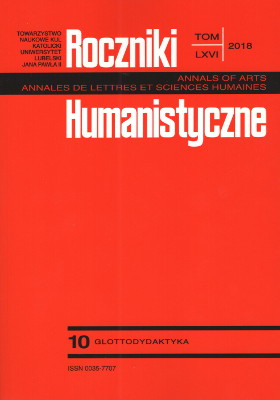Od lingwistyki teoretycznej do lingwistyki stosowanej – znaczenie koncepcji i paradygmatów językoznawczych w procesie glottodydaktycznym
From Theoretical Linguistics to Linguistics Applied – the Meaning of Concepts and Linguistic Paradigms in a Glottodidactic Process
Author(s): Małgorzata Rzeszutko-IwanSubject(s): Language and Literature Studies, Foreign languages learning, Applied Linguistics, Language acquisition
Published by: Towarzystwo Naukowe KUL & Katolicki Uniwersytet Lubelski Jana Pawła II
Keywords: glottodidactics; language; learning methods; knowledge; creation
Summary/Abstract: The aim of the article is to show the importance of linguistic knowledge (linguistic concepts) in the process of teaching Polish as a foreign language. It seems that these observations can also be transferred to the process of teaching each foreign language. Glottodidactics shows the language as a system (structuralism): patterns of varieties, inflectional terminology, word formation, etc., as a communication tool (sociolinguistics, pragmatics): attitudes towards communication competence, effectiveness, adaptation to situations, etc., as a source of culture and knowledge about the world (language of the world, cultural linguistics): phraseologies, proverbs, aphorisms, etc. Thus, the importance of theoretical linguistics in the methodology of teaching foreign languages can not be overlooked or underestimated. Just as over the years the interest of language linguists has shifted to individual subsystems, so today analogous shifts in glottodidactics can be observed. At present, pragmatics is at the center of linguistic research, and glottodacty teaching of efficiency is in the interest of the linguists.
Journal: Roczniki Humanistyczne
- Issue Year: 66/2018
- Issue No: 10
- Page Range: 135-146
- Page Count: 12
- Language: Polish

